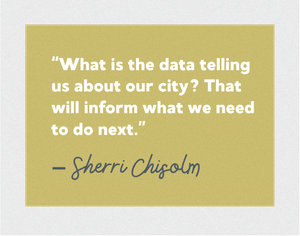I was intrigued by the work that Charlotte, North Carolina, had done with the help of the Brookings Institution to understand better the social capital, or lack of it, within their community. I spoke with Sherri Chisolm of Leading on Opportunity.
Social Capital Plays A Big Role in Opportunity and Equity
When we think about our work and social capital there are a couple things that come to the top of the list. First, it is understanding that most of us have been successful, yes, because of our hard work and efforts, but also because we had someone in our life that we are calling at Leading on Opportunity as a “life navigator.” A “life navigator” is someone who you go to when you’re trying to figure out how to get something done. For example, we think about what our experience was like. I think it’s always helpful to make it personal. When you were trying to get a driver’s license there was someone in your life who took you to Driver’s Ed. There was someone in your life who took you to the DMV to get that license. There was someone who then worked with you to make sure that you could drive. These are things that we took for granted, potentially, as individuals with parents or a guardian in our life. lmagine if you are a young person and you don’t have that support.
I, as someone who used to work in K-12, was astounded by how many young people didn’t have jobs simply because they didn’t have a license. That is very complex if you don’t have a car, if you don’t have a parent, or if you don’t have a home address. That becomes very difficult. So, while this is a microcosm of what that issue could be, with a life navigator, it’s someone who could support you and make sure that that work happens. We found that in our Black and brown communities, while they were richly diverse, they were often very narrow in terms of reach. So oftentimes, when you’re born into poverty as a person of color, your neighborhood makes up who your life navigators or support systems are. Conversely, when you compare that with someone who is not a person of color, their reach is much wider. Your parents may work in a larger organization who has a friend that they played golf with, or maybe that they travel with, and they then increase your network. And so in Charlotte, we wanted to think through how we could begin to manufacture some of those same experiences for individuals who may be from different backgrounds.
Social Capital Can Be Analyzed
Sherri's team engaged the Brookings Institution to analyze over 30,000 interpersonal network configurations in the city, drawing on rich data from 177 representative residents of Charlotte. Here's a snapshot of their approach from the final report.
These networks were then evaluated for size (i.e., number of people), breadth (i.e., range of connection types, such as familial or professional) and strength (i.e., the value of connection as a source of assistance). We compared social networks by demographic group, especially race, income, and gender. In particular, we assessed networks in terms of their value for access to opportunities and resources in three domains: jobs, education and housing.
The findings of the Brookings Institution quantitatively and qualitatively demonstrated a stark difference in the social capital and social networks of rich versus poor and Black individuals, especially Black men, versus whites.
White men benefit from the richest pool of social capital, with a large, broad, and strong set of connections, including multiple professional contacts, family members, and personal associates.
In contrast, they found that Black men in Charlotte had especially weak networks.
Black men typically rely on just one person for tangible support when exploring employment, educational, or housing opportunities.
Social Capital Not an Abstract Concept
Beyond the specific findings for Charlotte, we see in this work that Social Capital is not an abstract concept. Social capital represents a somewhat invisible system that is real, can be assessed, and has a far-reaching and often disparate impact on the individuals in our communities in terms of opportunity and equity.


